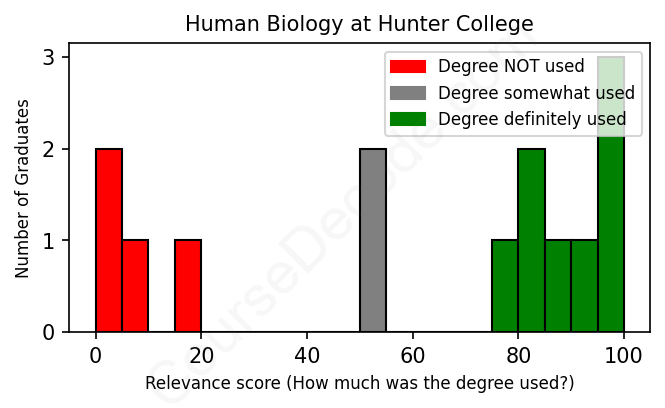
First, some facts. Of the Human Biology graduates from Hunter College we've analyzed , here's how many have used (or NOT used) their degree in their career:

These are estimates based on AI analysis of 14 LinkedIn profiles (see below).
The verdict? Below average. Overall, with an average relevance score of 60%, Human Biology graduates from Hunter College have a lower likelihood (-7%) of finding work in this field compared to the average graduate across all fields:
And for comparison, here's the chart for all profiles we've looked at across all degrees.
Also, after graduating, only 14% of these graduates have pursued further education other than another Bachelor's degree (such as a Masters degree or other), compared to the average across all profiles of 35%. This suggests a Bachelors degree is enough for most Human Biology graduates, and it's normal to look for work straight after graduation.
See the details:
|
Relevance score: 79% We think this person has gone into a career highly relevant to their degree. We think this person has gone into a career highly relevant to their degree.
DEGREE INFOGraduated in 2022 from Hunter College with a Bachelor's degree in Human Biology. No other secondary education since. JOB HISTORY SINCE GRADUATIONFascial Stretch Therapist Wellnessesity Apr 2022 - Present Aesthetics Manager  Wellnessesity Dec 2022 - Present ABOUTExperienced worker in the fitness and health & wellness industry. Strong administrative professional currently obtaining Bachelors degree in Human Biology focusing on pre-physical therapy. Skilled in establishing relationships, customer retention, sales, and multiple Microsoft applications. |
The top 10 most common jobs done by the graduates we've analyzed (ranked most common to least) are:
From analyzing various LinkedIn profiles of individuals who graduated with a degree in Human Biology from Hunter College, it looks like a mix of job roles appeared after graduation. A good number of graduates landed in positions like medical assistants, medical scribes, and physical therapy aides, where they could apply their understanding of human biology and healthcare. These roles are pretty relevant because they often require knowledge of anatomy, physiology, and patient care, which align directly with what students learned during their studies. On the other hand, many graduates took jobs that are not closely related to their field, like administrative roles, customer service positions, or jobs in the production industry, which usually don't require any specialized knowledge of human biology.
Overall, while some graduates found jobs that are highly relevant to their degree and actively utilize their knowledge in human biology, a notable portion ended up in professions that don't directly tie back to their studies. So, if you're considering a degree in Human Biology, it’s good to be aware that while you can pursue fulfilling roles in healthcare, there might be instances where you find yourself in jobs that don’t utilize that specialized knowledge. It’s all about how you frame your skills and experiences in the job market!
Here is a visual representation of the most common words in job titles for Human Biology graduates (this is across all Human Biology graduates we've analyzed, not just those who went to Hunter College):

Based on the LinkedIn profiles analyzed, graduates with a degree in Human Biology from Hunter College tend to start their careers in roles that are somewhat related to healthcare or support services soon after graduation. For example, many graduates took on jobs as medical scribes, home health aides, or assistants in various healthcare settings, suggesting a strong inclination toward the medical field. Some even transitioned to more specialized roles, such as ophthalmic technicians or nursing attendants, within a couple of years after graduating. This trend indicates that the degree prepares them well for jobs in health services, which is great if you're looking for relevant career paths right out of college.
However, looking a bit further down the line, like 5 to 10 years later, the trajectories appear a bit mixed. While some graduates seem to stay in healthcare, others have veered into unrelated fields, such as working as a sales specialist at Apple or even pursuing roles in video production. This suggests that while many start in health-related positions, not all stay directly within the Human Biology realm. Ultimately, if you're considering this degree, you'll likely have a solid entry point into the healthcare industry, but personal interests and opportunities might lead to diverse career paths as you progress in your professional journey.
A Bachelor’s degree in Human Biology can be a mix of challenging and rewarding, and it really depends on how you tackle it. At Hunter College, like most places, you’ll dive into a good amount of science courses—think biology, chemistry, and anatomy—which can definitely be tough if you’re not super into that stuff or haven’t had a strong foundation in it. However, if you enjoy learning about the human body and how it works, it could be more on the interesting side for you. You’ll definitely have to stay organized, manage your time, and keep up with readings and assignments, but it’s not considered one of the hardest degrees out there. Overall, it’s more of a moderate challenge compared to some other science-heavy programs, so if you're willing to put in the work, you’ll likely do just fine!
Most commonly, in the LinkedIn profiles we've looked at, it takes people 4 years to finish a Bachelor degree in Human Biology.
Alright, so looking at these Hunter College grads, it seems like a mixed bag when it comes to making decent money. Those who landed positions in healthcare or tech, like the Medical Assistants or Apple sales roles, might be raking in a decent paycheck—especially at places like New York-Presbyterian or Apple, which are known for competitive salaries. But others, especially early on, took some entry-level gigs like administrative roles or physical therapy aides, which typically don’t pay all that great. Plus, many have been hopping around positions without a clear upward trend yet, which can suggest they’re still building experience rather than cash. So overall, while some are likely doing alright, others may still be trying to get to that sweet spot of financial stability.
Here is a visual representation of the most common words seen in the "about" section of LinkedIn profiles who have a Bachelor degree in Human Biology (this is across all Human Biology graduates we've analyzed, not just those who went to Hunter College). This may or may not be useful:

Here are all colleges offering a Bachelor degree in Human Biology (ordered by the average relevance score of their Human Biology graduates, best to worst) where we have analyzed at least 10 of their graduates:
| College | Score | Count |
|---|---|---|
 Indiana University Bloomington Indiana University Bloomington
|
95 | 10 |
 University of California San Diego University of California San Diego
|
89 | 20 |
 UC San Diego UC San Diego
|
89 | 18 |
 University of California, San Diego University of California, San Diego
|
86 | 16 |
 Stanford University Stanford University
|
84 | 10 |
 University of California, Merced University of California, Merced
|
84 | 16 |
 University of Wisconsin-Green Bay University of Wisconsin-Green Bay
|
79 | 10 |
 North Carolina State University North Carolina State University
|
75 | 31 |
 Michigan State University Michigan State University
|
71 | 48 |
 The University of Texas at Austin The University of Texas at Austin
|
69 | 17 |
 University at Albany, SUNY University at Albany, SUNY
|
69 | 15 |
 Hunter College Hunter College
|
60 | 14 |
 University of Southern California University of Southern California
|
58 | 16 |